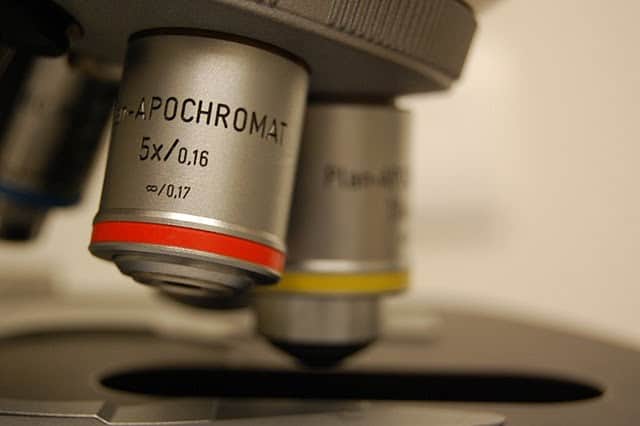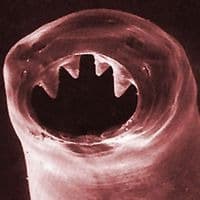All the things in this world are gifts of God, presented to us so that we can know God more easily and make a return of love more readily.
–First Principle and Foundation, St. Ignatius of Loyola
All things dull and ugly,
All creatures short and squat,
All things rude and nasty,
The Lord God made the lot.–“All Things Dull And Ugly”, Monty Python
I study parasites. Don’t worry. I’m used to the many people who dry-heave and cringe, “Eewww! Parasites?!” after I tell them. Not everybody responds that way, though. Some want to know how, or if, parasites can benefit themselves or society. But exclusively seeking such an instrumental or economic value ignores any possibility that parasites might have intrinsic value of their own. Intrinsic value, you say? By virtue of being created by God, they must, in and of themselves, be good. After all, Christians believe that God created the world and “found it was very good.” (Genesis 1:30)
All the time, you hear people say that they find God in nature. Maybe it’s by gazing up at the beautiful swirling infinity of the nighttime sky. Maybe in the majestic but gentle gliding of a bird in flight. Or maybe in the adorable cuddliness of puppies or kittens. But, let’s face it. Nature isn’t just kittens playing with dogs’ tongues or baby pandas sneezing. (So adorable!) As Monty Python points out, creation includes some nasty critters too. We’re quick to dismiss them, yet Ignatius tells us that everything in creation, dull and ugly included, can bring us closer to God. To take our belief in the fundamental goodness of the world seriously, we need to see beyond the charismatic, sexy mega-fauna of Creation.
In this two-parter, I want to show that parasites, which get such a bad rap are good and beautiful. Goodness and beauty, along with being, unity and truth are examples of transcendentals, which according to medieval philosophers, are attributes that belong to every being that exists. For example, obviously everything that exists has being. And if it has one being, then it has unity (if a thing that exists lacks unity, then it must be two or more distinct things). And if a thing has an inherent intelligibility that the human mind can grasp then it is true. Most importantly for us, medieval philosophers argued that everything that exists is good and beautiful. This is more difficult to demonstrate for some things than others. I mean, most everyone would agree that rainbows are beautiful and good. But parasites? Before we talk about how, it’s probably useful to tackle another tricky concept: defining what a parasite is.
In its broadest sense, a parasite is any organism that benefits at the expense of another organism. So the list includes, viruses, bacteria, protozoans, malaria, most fungi, tapeworms, hookworms, whipworms, most nematodes, many kinds of insects, a few kinds of plants, the brood parasites of birds such as the cuckoo, and a certain Jesuit I live with. Parasitism is the most common life history strategy on the planet. Note, however, that like all things in biology this definition gives us a spectrum rather than a clearly-defined singularity.
For example, some organisms may be parasitic only part of their life. Other organisms are usually mutualistic (a flashy science word which just means that the relationship benefits both partners) but will switch to a parasitic life style if conditions change. Still other parasites are more, shall we say “intimately” associated with their host, like tapeworms, while others are less so, like the pesky mosquito that gets its blood meal and then flies away. Again, the “intimacy” of a parasite occurs along a spectrum and the relationship can blur into other symbiotic relationships. Even the Oxford English Dictionary gives the definition of parasite an interesting nuance:
Parasite – a person who lives at another’s expense… a person who eats at the table of another, a person who lives at another’s expense and repays him or her with flattery… a priest who is permitted meals at the public expense… (emphasis mine)
Disclaimer: I was interested in parasites long before I felt called to be one! So much for a working definition. On to how parasites could be good.
We are inter-dependent upon a large external ecosystem for basic needs like food, water and oxygen. At the same time, each one of us also depends upon our own internal microscopic ecosystem of bacteria and parasites1. Insofar as we are good, parasites are good because they are an integral part of who we are. Our guts contain thousands of species of bacteria, all interacting with each other and with our bodies, aiding digestion, influencing our appetites and helping us resist disease.
We are often exposed to parasitic worms, especially in our childhood. But exposure to these types of parasites is much more common in developing countries and during our evolutionary past. As we co-evolved with these parasites, they calibrated our immune systems, helping them to turn on and off correctly. Our modern obsession with hygiene and the availability of clean water have eliminated many of these common parasites. As a result, we see immune-related problems such as allergies and auto-immune diseases concentrated in the developed world, but almost completely lacking in the developing world.2
We also have testimony (but few clinical trials) of people who intentionally ingested parasites to cure their autoimmune diseases and allergies. In case you’re eating, I won’t describe in detail what this guy did to try to get hookworm to cure his asthma. Just to keep the lawyers happy, please note that I (and the Jesuit Post) do not advocate any of these experimental treatments, most of which lack clinical evidence showing that they actually work. Anyway, this all suggests that we need exposure to parasites to ensure the proper functioning of our immune systems (sometimes referred to as the hygiene or hyper-hygiene hypothesis). Sharon Shattuck’s film, Parasites: A User’s Guide, does an excellent job of explaining this fascinating relationship.
Parasites don’t only influence our physiology, though. Just as parasites have influenced our digestive and immune systems, it turns out that they might have an influence on behavior and culture also. Even though scientists are still researching these relationships among parasites, culture, behavior, and personality, the recent findings are pretty wild:
Just as for xenophobia, being introverted and sexually conservative both seemed like good ideas when socially transmitted diseases were common. Together then, Fincher, Thornhill, Schaller, and Murray imagined that the key elements of differences among cultures and individuals were nearly all related to disease. We are who we are because of disease.3
One obvious example of the link between parasites and behavior exists in the rural tropics where families still groom each other to remove lice. Such behavior does not occur among, say, urban New Yorkers where lice are absent. Another example occurs with a parasite found in cats called Toxoplasmosa. Everybody knows that rats avoid cats. Anyone who has ever seen Tom and Jerry or Itchy and Scratchy knows that. But studies have shown that rats infected with Toxoplasmosa, instead of avoiding cats, are attracted to them. Not one to bypass an easy meal, the cat eats the infected rat and becomes infected. The life cycle of Toxoplasmosa is complete. (#parasitewinning) Less conclusive studies are showing that humans accidently4 infected with Toxoplasmosa behave differently from uninfected humans. For example, research in Czechoslovakia showed that:
compared with uninfected men, males who had the parasite were more introverted, suspicious, oblivious to other people’s opinions of them, and inclined to disregard rules. Infected women, on the other hand, presented in exactly the opposite way: they were more outgoing, trusting, image-conscious, and rule-abiding than uninfected women.
Because infection rates differ among geographical regions, another study suggested that Toxoplasmosa infection may influence human culture. All of this research is showing that microorganisms and parasites have shaped not only our physiologies, but also our behaviors and psychologies over evolutionary time. In other words, parasites are an integral part of who we are and how we behave as human beings. To the extent that we are good, then parasites are good.
In the fast-approaching season of Advent, we await God’s Incarnation. No, I’m not referring to the delicious instant breakfast drink. I’m talking about the moment God takes on flesh in the form of Jesus and so becomes subject to death, suffering and, (you guessed it!) parasites, just like we are. Yes folks, Jesus had parasites. In fact, if parasites play such an important role in shaping our humanity, then Jesus had to have parasites to be fully human. We don’t like to think about this aspect of Jesus’ humanity. How many pieces of art depict Jesus vomiting with the flu? When was the last time we sang a hymn about Jesus’ intestinal parasites? We shy away from the very thought that Mary ever had to change Jesus’ diapers (or their first century equivalent). This “dirty” reality of being human brings new understanding to Paul’s hymn:
“Rather, he emptied himself, taking the form of a slave, coming in human likeness; and found in human appearance, he humbled himself, becoming obedient to death, even death on a cross.” (Philippians, 2: 7-8)
What does it mean that Jesus become obedient to death and, by extension, disease? What does it means that God, in Jesus, has fully participated in the human experience? From our human perspective, we encounter God’s love through the humanity of Jesus. Because Jesus shares in our human nature, we can share in his divine nature. To paraphrase St. Athanasius, “The Son of Man becomes human so that we might become God”. Looking from the perspective of the rest of creation, by becoming human, God sanctifies not only humanity, but also all of creation. Yes, all of creation. The nighttime sky, the soaring eagle, the pawing kitten and the sneezing panda. But also, the Incarnation affirms the goodness of both humanity and its parasites.
***
Editor’s note: read part two here.
— — — — —
- Sachs, Jessica Snyder. Good Germs, Bad Germs: Health and Survival in a Bacterial World (New York: Hill and Wang, 2008) ↩
- Dunn, Rob. The Wild Life of Our Bodies: Predators, Parasites, and Partners That Shape Who We Are Today (Kindle Edition: Harper Collins, Inc, 2011), p 222. ↩
- Dunn, Rob. The Wild Life of Our Bodies: Predators, Parasites, and Partners That Shape Who We Are Today (Kindle Edition: Harper Collins, Inc, 2011), pp. 222-223 ↩
- By “accidently” I simply mean that humans are not the normal host. In fact, toxoplasmosis prevalence among humans is extremely high in some countries. One study found that 57.6% of pregnant women in rural Egypt were infected with Toxoplasmosa. ↩






